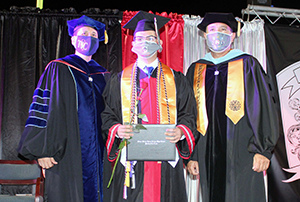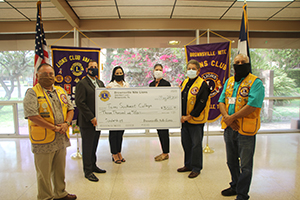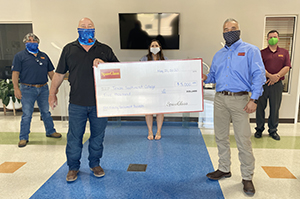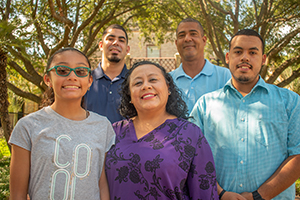ARP: American Rescue Plan (HEERF III)
The Higher Education Emergency Relief Fund (HEERF III) is authorized by the American Rescue Plan (ARP), Public Law 117-2, signed into law on March 11, 2021, providing $39.6 billion in support to institutions of higher education to serve students and ensure learning continues during the COVID-19 pandemic.
ARP funds are in addition to funds authorized by the Coronavirus Response and Relief Supplemental Appropriations Act, 2021 (CRRSAA), Public Law 116-260 and the Coronavirus Aid, Recovery, and Economic Security (CARES) Act, Public Law 116-136. Emergency funds available to institutions and their students under all emergency funds total
$76.2 billion. Taken together, the Coronavirus Aid, Relief, and Economic Security Act (CARES Act) (Pub. L. 116–136), the Coronavirus Response and Relief Supplemental Appropriations Act, 2021 (CRRSAA) (Pub. L. 116-260), and the ARP represent HEERF I, HEERF II, and HEERF III, respectively. HEERF III is structured like the HEERF II programs under the CRRSAA, with certain important differences as noted on website https://www2.ed.gov/about/offices/list/ope/arpfaq.pdf.
Acknowledgment
Texas Southmost (TSC) has received additional funding from the American Rescue Plan and was authorized a total of $7,727,922 ARP funds (HEERFIII) to be used as emergency relief for students on May 14, 2021.
CRRSAA: Higher Education Emergency Relief Fund (HEERF I & II)
The Higher Education Emergency Relief Fund II (HEERF II) is authorized by the Coronavirus Response and Relief Supplemental Appropriations Act, 2021 (CRRSAA), Public Law 116-260, signed into law on Dec. 27, 2020. In total, the CRRSAA authorizes $81.88 billion in support for education, in addition to the $30.75 billion expeditiously provided last spring through the Coronavirus Aid, Recovery, and Economic Security (CARES) Act, Public Law 116-136.
On December 27, 2020, the U.S. President signed the Coronavirus Response and Relief Supplemental Appropriations Act, 2021 (CRRSAA) (P.L. 116-260). This new law gives the U.S. Department of Education (Department) approximately $22.7 billion to distribute to institutions of higher education in order to prevent, prepare for, and respond to coronavirus through the HEERF. This law has some similarities—as well as important differences—from the Coronavirus Aid, Relief, and Economic Security Act (CARES Act) (P.L. 116–136) that was enacted on March 27, 2020.
Acknowledgment
Texas Southmost (TSC) has received additional Higher Education Emergency Relief Funds (HEERF II) and was authorized a total of $1,804,140 HEERF II funds to be used as emergency relief for students on January 21, 2021.
Unlike the CARES Act I, the CRRSAA (HEERFII) requires that institutions prioritize students with exceptional need, such as students who receive Pell Grants, in awarding financial aid grants to students. However, students do not need to be only PELL recipients or students who are eligible for Pell grants. Institutions may not (1) condition the receipt of financial aid grants to students on continued or future enrollment in the institution, (2) use the financial aid grants to satisfy a student’s outstanding account balance, unless it has obtained the student’s written (or electronic), affirmative consent, or (3) require such consent as a condition of receipt of or eligibility for the financial aid grant.
The Coronavirus Aid, Relief and Economic Security (CARES) Act was passed by Congress and signed into law to provide economic relief from COVID-19. One section of the CARES Act established the Higher Education Emergency Relief fund (HEERF I) for schools to use for emergency financial aid grants to students for expenses related to the disruption of campus operations due to the pandemic.
Acknowledgment
Texas Southmost (TSC) has received additional Higher Education Emergency Relief Funds and was authorized a total of $1,804,140 HEERF I funds to be used as emergency relief for students on April 25, 2020.
UPDATES ON STUDENT PORTION DISBURSEMENTS:
- As of April 10, 2023, TSC does not have any changes to report.
- As of Jan 10, 2023, TSC does not have any changes to report.
- As of Oct 4, 2022, TSC distributed to 3,647 students funds of $1,586,445 under ARP (HEERF III) to provide direct relief to students and ensure learning continues during the COVID-19 national emergency. This ARP Emergency Financial Aid Grant funding is in addition to the $9,766,993 distributed previously.
- As of April 28, 2022, TSC distributed to 3,138 students funds of $2,353,500 under ARP (HEERF III) to provide direct relief to students and ensure learning continues during the COVID-19 national emergency. This ARP Emergency Financial Aid Grant funding is in addition to the $7,436,336 distributed previously.
- As of April 8, 2022, TSC does not have any changes to report.
- As of Jan 10, 2022 TSC distributed to 3,837 students additional funds of $1,918,500 funds under ARP (HEERF III) to provide direct relief to students and ensure learning continues during the COVID-19 national emergency. This ARP Emergency Financial Aid Grant funding is in addition to the $5,517,836 (which includes the $1,918,500 and the $3,599,336 funds distributed previously).
- As of Nov 1, 2021 TSC distributed to 3,837 students a total of $1,918,500 funds under ARP (HEERF III) to provide direct relief to students and ensure learning continues during the COVID-19 national emergency. This ARP Emergency Financial Aid Grant funding is in addition to the $3,599,336 funds distributed previously.
- As of Oct 8, 2021, TSC distributed to 3,618 students; the total disbursed to students under CARES I & II is
$3,599,336 includes returned/unclaimed student grants of ($16,302).
- As of July 8, 2021, TSC distributed to 3,618 students; the total disbursed to students under CARES I & II is
$3,599,336 includes returned/unclaimed student grants of ($6,520).
- As of April 9, 2021, TSC distributed to 3,618 students ($2,358,936 in CRRSAA CARES ACT II Emergency Financial Aid Grants). The total disbursed to students under CARES I & II is $3,599,336.
- As of Jan 7, 2021, TSC does not have any changes to report.
- As of 5/27/2020, TSC has distributed to students the total amount of $1,246,800 for the Emergency Financial Aid Grants under Section 18004(a)(1) of the CARES Act.
- The estimated total number of 3,133 students at TSC were eligible to participate in programs under Section 484 in Title IV of the Higher Education Act of 1965 and thus eligible to receive Emergency Financial Aid Grants to students under Section 18004(a)(1) of the CARES Act.
Who is Eligible?
Under CARES I & II: Students who meet all criteria below are eligible to apply Round One (NOW CLOSED):
– Working towards a degree or certificate at Texas Southmost College.Students enrolled in Spring 2020 who are eligible to participate in programs under Section 484 in Title IV of the Higher Education Act of 1965 qualified for Round One of CARES.
– The U.S. Department does not allow HEERF II Student Emergency Aid Grants to be awarded to International Students, undocumented or DACA Students and student who left the university prior to March 13, 2020.
– The following expenses that can be considered for grant assistance under CARES (I&II) include food, housing, course materials, technology (such as having to buy a computer when courses were moved online), health care, child care, transportation.
– Students may elect to have funds go to an outstanding account balance if student gives authorization (CARES II)
Under ARP, Individuals who meet the following criteria are eligible.
• Students are no longer required to be eligible for Title IV student financial aid in order to receive HEERF grants to students.
• Students who are or were enrolled in an institution of higher education during the COVID-19 national emergency (on or after the date of the declaration of the national emergency March 13, 2020) are eligible for emergency financial aid grants from the HEERF, regardless of whether they completed a Free Application for Federal Student Aid (FAFSA) or are eligible for Title IV. As under the CRRSAA, institutions are directed with the ARP funds to prioritize students with exceptional need, such as students who receive Pell Grants or are undergraduates with extraordinary financial circumstances in awarding emergency financial aid grants to students.
• Beyond Pell eligibility, other types of exceptional need could include students who may be eligible for other federal or state need-based aid or have faced significant unexpected expenses, such as the loss of employment (either for themselves or their families), reduced income, or food or housing insecurity. In addition, the CRRSAA and ARP explicitly state that emergency financial aid grants to students may be provided to students exclusively enrolled in distance education.
• The Department’s final rule on student eligibility for HEERF states that all students who are or were enrolled in an institution of higher education during theCOVID-19 national emergency are eligible for emergency financial aid grants from the HEERF, regardless of whether they completed a FAFSA or are eligible for Title IV. That includes citizens, permanent residents, refugees, asylum seekers, Deferred Action for Childhood Arrival (DACA) recipients, other DREAMers, and similar undocumented students.
• International students may also receive HEERF. However, institutions must ensure that funds go to students who have exceptional need. The Department encourages institutions to prioritize domestic students, especially undergraduates, in allocating this funding. This includes citizens, permanent residents, refugees, asylum seekers, DACA recipients, other DREAMers, and similar undocumented students.
• Students studying abroad may receive HEERF emergency financial aid grants from the recipient institution where they are enrolled. These students must meet the criteria based on prioritizing exceptional need that the institution has established for distributing its HEERF emergency financial aid grants.
For more information on the HEERFI, II, III, please visit the Department of Education at:
ARP: American Rescue Plan (HEERF III) (ed.gov)
http://www2.ed.gov/about/offices/list/ope/caresact.html
Quarterly Budget and Expenditure Reporting for HEERF I, II, III (a)(1) Institutional Portion Reporting updated on April 10, 2023
00364300 HEERF Q12023 041023
00364300_HEERF_Q12022_022323
00364300_HEERF_Q32021_022323
00364300_HEERF_Q42021_022323
00364300_HEERF_Q42022_011023
00364300_HEERF_Q32022_101022
00364300_HEERF_Q22022_070822
HEERF Quarterly Report through March 31, 2022
HEERF Quarterly Report through December 31, 2021
Updated HEERF Quarterly Report through September 30, 2021
HEERF Quarterly Report through September 30, 2021
HEERF Quarterly Report through September 30, 2021
HEERF Quarterly Report through March 31, 2021
HEERF Quarterly Report through December 31, 2020
HEERF Quarterly Report through September 30, 2020
For recipients of the CARES Act – Higher Education Emergency Relief Fund (HEERF I & II) Institutional portion, recipients must comply with all reporting requirements and fill out the Quarterly Budget and Expenditure Reporting form and publicly report it on institution’s website. The quarterly expenditure reports are posted accordingly.
Texas Southmost College was awarded funding in the amount of $1,804,140 from the Department of Education pursuant to the institution’s Certification and Agreement [for] Institutional Portion on May 4, 2020 and the college was also awarded $6,970,294 on Jan 19, 2021. On May 14, 2021, Texas Southmost College was awarded an additional $7,708,772 HEERF III funds to be used for institutional relief.
As of April 10, 2023, Texas Southmost College expended ($1,473,106) Institutional Funds under Section 18004(a)(1) of the CARES Act I, II & III as noted on the Quarterly Budget and Expenditure Reporting form for period Jan 1, 2023 through March 31, 2023.
As of Jan 10, 2023, Texas Southmost College expended ($441,778) Institutional Funds under Section 18004(a)(1) of the CARES Act I, II & III as noted on the Quarterly Budget and Expenditure Reporting form for period Oct 1, 2022 through Dec 31, 2022.
As of Oct 10, 2022, Texas Southmost College expended ($590,052) Institutional Funds under Section 18004(a)(1) of the CARES Act I, II & III as noted on the Quarterly Budget and Expenditure Reporting form for period July 1, 2022 through Sept 30, 2022.
As of July 8, 2022, Texas Southmost College expended ($980,778) Institutional Funds under Section 18004(a)(1) of the CARES Act I, II & III as noted on the Quarterly Budget and Expenditure Reporting form for period April 1, 2022 through June 30, 2022.
As of April 7, 2022, Texas Southmost College expended ($2,119,838) Institutional Funds under Section 18004(a)(1) of the CARES Act I & II & III as noted on the Quarterly Budget and Expenditure Reporting form for period Jan 1, 2022 through March 31, 2022.
As of Jan 10, 2022, Texas Southmost College expended ($1,320,994) Institutional Funds under Section 18004(a)(1) of the CARES Act I & II & III as noted on the Quarterly Budget and Expenditure Reporting form for period Oct 1, 2021 through Dec 31, 2021.
As of Oct 8, 2021 Texas Southmost College ($3,139,950) Institutional Funds under Section 18004(a)(1) of the CARES Act I & II & III as noted on the updated Quarterly Budget and Expenditure Reporting form for period July 1, 2021 through September 30, 2021.
As of April 12, 2021, Texas Southmost College expended ($2,810,015) Institutional Funds under Section 18004(a)(1) of the CARES Act I & II as noted on the Quarterly Budget and Expenditure Reporting form for period January 1 through March 31, 2021. This quarterly report was updated on July 8, 2021.
As of December 31, 2020, Texas Southmost College has expended ($155,803) Institutional Funds under Section 18004(a) (1) of the CARES Act. The Quarterly Budget and Expenditure Reporting form for period through October 1 through December 31, 2020 is posted.
As of September 30, 2020, Texas Southmost College has not expended Institutional Funds under Section 18004(a) (1) of the CARES Act as noted on the first Quarterly Budget and Expenditure Reporting form for period through Sept 30, 2020. For more information on the CARES Act: Higher Education Emergency Relief Fund, please refer to U.S. Department of Education. https://www2.ed.gov/about/offices/list/ope/caresact.html
ARP: American Rescue Plan (HEERF III) (ed.gov)
CRRS AA: Higher Education Emergency Relief Fund II (HEERF II)
Are there other funds to help students?
Texas Southmost College does offer additional support to students through the TSC Foundation, private donors, federal, state, and institutional grants. TSC cares for its students and will do all it can to help them during this difficult time. Students may apply for aid from the CARES Act and other support.
Last updated April 10, 2023.







